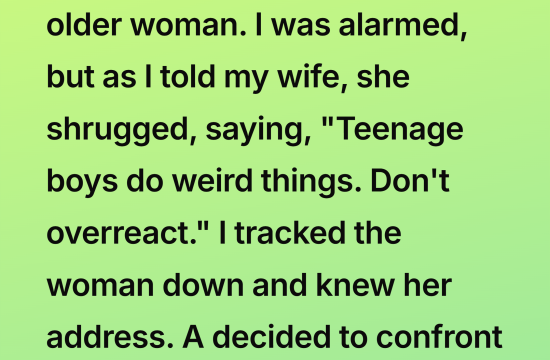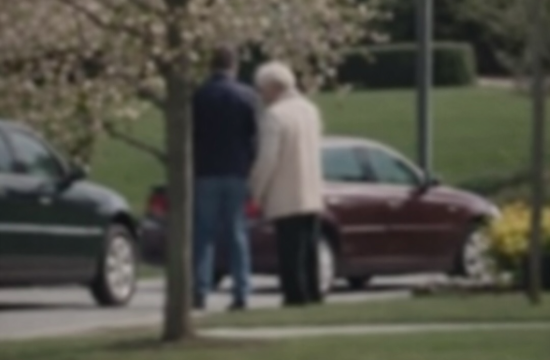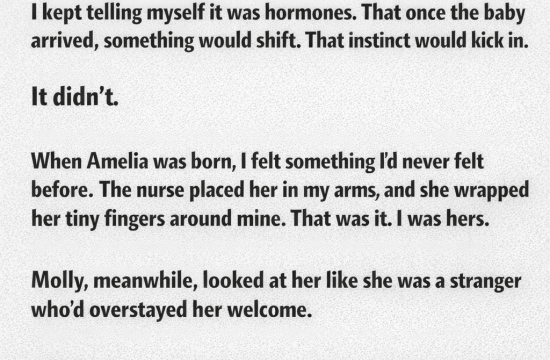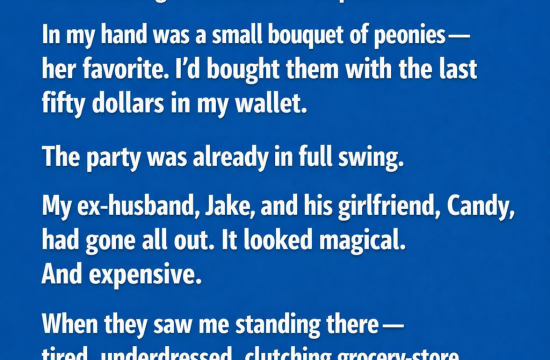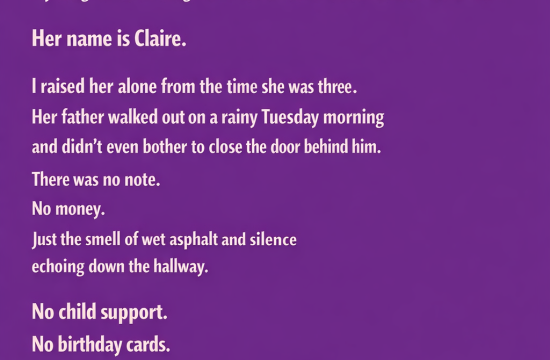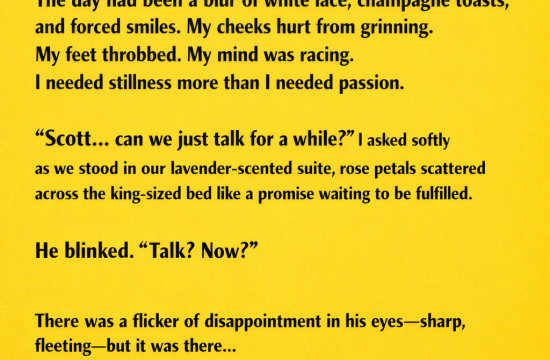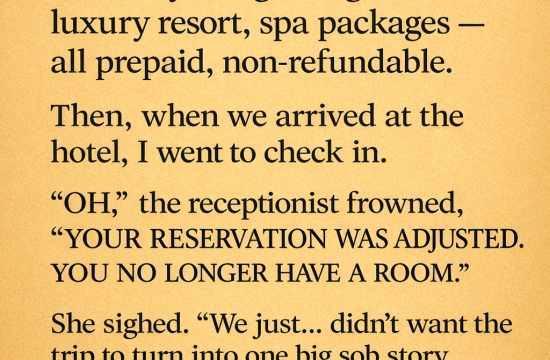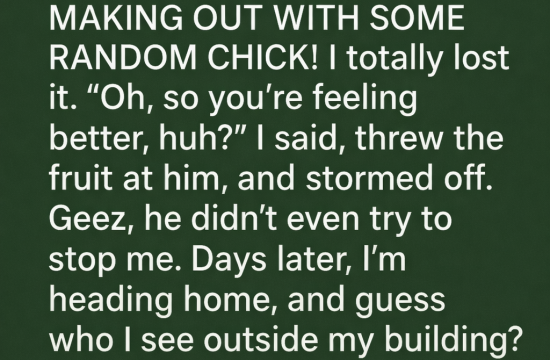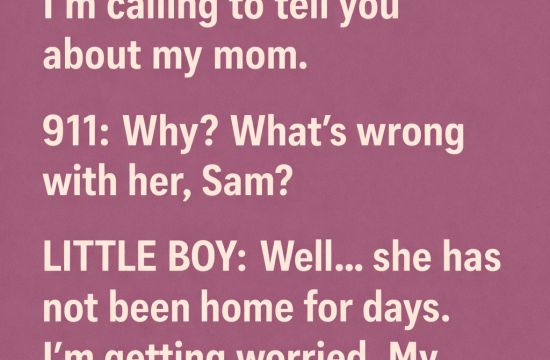I’m Mike. I’m 40. I run a small auto repair shop just outside Spokane. I used to love Sundays—getting up early, flipping on the old vinyl player, making pancakes, sipping coffee while the sun rose. But that was before life split in two: before and after Sweeney.
She was my wife. Fierce, funny, always cold, and somehow always barefoot. Four years ago, I lost her to a heart condition we never even knew she had. One minute, she was laughing in the living room with her chamomile mug, and the next, I was standing in a sterile hospital room, holding her sweater like it might still be warm.
It wasn’t.
We never had kids. We’d planned to—but there was always something else. A trip to Iceland. That espresso machine she swore would save us money. “Later,” she’d say. “When we’re ready.”
Later never came.
So I built a quiet life. Mornings were mine. Nights too. It wasn’t exciting, but it was peaceful. Until two months ago, when Jenny—my 34-year-old sister—called just after midnight, sobbing so hard I couldn’t make out words.
“I’m sorry,” she kept saying. “I messed everything up. I can’t go back.”
She had left her boyfriend—or fled. She didn’t say much, but I heard enough: controlling, jealous, angry. She had Mason, who’s seven, and Lila, four, in the backseat. She asked if she could crash with me for a few days.
I said, “Get here. You and the kids can stay as long as you need.”
And I meant it.
They pulled in the next morning. Jenny looked like she hadn’t slept in a week. The kids were quiet and unsure. Mason clung to a stuffed raccoon. Lila blinked up at me like she didn’t know where she’d landed.
I took their bags, showed them to the guest rooms, and told them this was home for now.
The first few weeks were heavy. Jenny barely spoke. I’d catch her staring out the window, eyes hollow. When Mason asked, “When are we going back home?” she’d just whisper, “Not yet, sweetie.”
I didn’t push.
I started waking up earlier. By 7 a.m., eggs would be sizzling or toast popping. Thought it might help the kids feel normal again. But soon, something felt… off.
“Eggs again?” Mason muttered one morning, poking at his plate.
“You don’t like eggs?” I asked, surprised.
“Mom lets me have Lucky Charms.”
Lila wrinkled her nose. “I want pancakes.”
I sighed. “Well, Uncle Mike’s making breakfast. If you don’t like it, maybe Mom can whip up something else?”
They exchanged a glance—then bolted upstairs like I’d just insulted them.
Jenny didn’t come down until 1 p.m.
Again.
That night, once the house was quiet, I decided to check on her. I knocked softly.
No answer.
“Jen? You up?” I tried again.
Still nothing.
I cracked the door. Her bed was perfectly made. No one under the blanket. Her phone sat dark on the nightstand.
That froze me.
Jenny never went anywhere without that phone. Once, she turned around halfway to a wedding because she’d forgotten it.
I checked the front door cam: nothing but raccoons and wind.
Then I remembered the back gate.
I pulled up the backyard camera. There she was—slipping out at 10:47 p.m., hoodie up, moving fast. No bag, no keys. Just… gone.
My chest tightened.
I checked the past nights—same pattern. Out around 10 or 11, back before sunrise. Quiet. Careful.
I didn’t sleep. My thoughts raced: Was she in trouble? Was she seeing someone? Had she slipped back into something darker?
The next morning, after the kids had cereal and ran off to play, I went to her room again. My hand was raised to knock when I heard her voice through the door.
Soft. Hushed. On the phone.
“Yeah, he’s still buying it. I think we’re good. A few more days and I’ll be out of here.”
Her voice was low—but crystal clear.
I froze, heart pounding.
“No, he has no clue. I’ve been telling the kids what to say. They’ve been good about it. He doesn’t suspect anything.”
My legs locked.
“I just want to start clean, you know? No baggage. Just us. No kids, no drama.”
She laughed. Light. Almost giddy.
That was it.
I backed away, slow and silent. Down the hall, down the stairs, into the kitchen—where I sat, staring into my cold coffee like it might explain what the hell to do.
Jenny wasn’t grieving.
She wasn’t healing.
She was planning her exit—leaving the kids behind like they were baggage.
And I was the fool holding it all together.
I thought of Mason trailing me in the garage last week, asking about every tool on the wall. I thought of Lila curled up in my lap, whispering bedtime lines from memory.
They trusted me.
And she was ready to vanish.
At 1 p.m., she wandered down. Hair in a messy bun. Wearing one of my old sweatshirts. Didn’t even look at me—just flopped into a chair and scrolled through her phone.
I kept my voice calm. “We need to talk.”
She sighed. “What now?”
“I know you’ve been sneaking out every night,” I said. “I saw the footage.”
She blinked. Froze. Her thumb hovered in the air.
“I also heard the call this morning,” I added. “You’re planning to leave them here. Disappear with your boyfriend?”
For a moment, I thought she might deny it. But her mouth just stayed open. No words.
“I’m not angry,” I said. “But I’m not stupid either.”
She leapt up. “You went through my stuff? You spied on me?”
“No,” I said. “I knocked. You didn’t answer. Your phone was there. Your bed was untouched. I got worried. So I checked the cameras.”
She crossed her arms, jaw tight.
“You wouldn’t do anything,” she muttered. “You’re not like that.”
I pulled a folded paper from my pocket and slid it across the table.
Three numbers: a parenting support center, a therapist, legal aid.
“You have two options,” I said. “One: get help. I’ll back you up. But you step up as their mom. No more sneaking out. No more sleeping till noon.”
She didn’t move.
“Or two: you leave. But I make the calls. I tell child services everything. Let them decide what happens next.”
She scoffed. “You think I care? Go ahead.”
I stared at her. “Try me.”
We locked eyes for a long moment. Then she looked away.
That night, she packed a duffel. Quiet. No yelling. No slammed doors. Just the slow zip of a bag and footsteps down the stairs.
She didn’t say goodbye.
Not to me. Not to the kids.
She didn’t even take her phone.
Just walked out, leaving the front door half open behind her.
Later, I tucked Mason into bed. He looked up, eyes wide.
“Is Mom coming back?”
I sat beside him. “I don’t know, buddy.”
He nodded, like he already knew.
Lila clutched her bunny tighter. “I like it better when you make pancakes,” she whispered.
I smiled, though it hurt. “Tomorrow, chocolate chip?”
She nodded and crawled into my lap.
That night, I stood in their doorways just watching them breathe.
I didn’t call child services.
Jenny was right—I’m not like that.
But I’m not letting them get hurt again, either.
I never signed up for this. I buried my wife. Built a quiet life. And somehow, ended up with bedtime stories and tiny socks in my laundry.
But the truth?
That quiet life was never full.
Not like this.
I don’t know what the future holds.
But I’m here. For however long they need me.
Because they deserve better.
And I’m not going anywhere.



